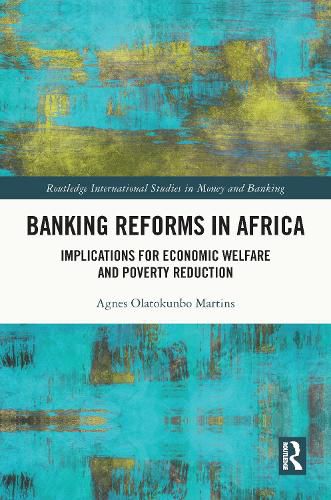Readings Newsletter
Become a Readings Member to make your shopping experience even easier.
Sign in or sign up for free!
You’re not far away from qualifying for FREE standard shipping within Australia
You’ve qualified for FREE standard shipping within Australia
The cart is loading…






This book comprehensively explores the intricate relationship between banking reforms, economic well-being, and poverty reduction across the African continent. Delving into the historical roots of banking reforms, it examines the resilience of banking sectors in key African countries like South Africa, Nigeria, Kenya, MENA, and beyond.
The findings suggest that much attention should be paid to the design of banking systems and how banks are regulated. This focus on banks differs from many discussions on the topic, which tend to be more concerned with other policy areas such as economic policy, international trade policy, and aid. The book's extensive and contemporary overview of banking reforms enables a comparative analysis of regulatory frameworks, supervision practices, and government interventions. It evaluates theoretical frameworks linking banking reforms to bank stability and resilience, drawing on financial intermediation, resource allocation, systemic risk, and financial development concepts. It empirically tests the causal relationships between the Basel II/III capital reforms, bank sector resilience, economic growth, and poverty reduction and identifies and analyses the channels and mechanisms through which banking reforms affect economic welfare and poverty reduction in Africa, such as credit availability, financial efficiency, financial innovation, and financial access.
The book offers an insightful exploration into a brighter economic future on the African continent. The findings presented herein offer valuable insights for policymakers, researchers, and practitioners striving to enhance financial stability, foster economic growth, and alleviate poverty in Africa.
$9.00 standard shipping within Australia
FREE standard shipping within Australia for orders over $100.00
Express & International shipping calculated at checkout
Stock availability can be subject to change without notice. We recommend calling the shop or contacting our online team to check availability of low stock items. Please see our Shopping Online page for more details.
This book comprehensively explores the intricate relationship between banking reforms, economic well-being, and poverty reduction across the African continent. Delving into the historical roots of banking reforms, it examines the resilience of banking sectors in key African countries like South Africa, Nigeria, Kenya, MENA, and beyond.
The findings suggest that much attention should be paid to the design of banking systems and how banks are regulated. This focus on banks differs from many discussions on the topic, which tend to be more concerned with other policy areas such as economic policy, international trade policy, and aid. The book's extensive and contemporary overview of banking reforms enables a comparative analysis of regulatory frameworks, supervision practices, and government interventions. It evaluates theoretical frameworks linking banking reforms to bank stability and resilience, drawing on financial intermediation, resource allocation, systemic risk, and financial development concepts. It empirically tests the causal relationships between the Basel II/III capital reforms, bank sector resilience, economic growth, and poverty reduction and identifies and analyses the channels and mechanisms through which banking reforms affect economic welfare and poverty reduction in Africa, such as credit availability, financial efficiency, financial innovation, and financial access.
The book offers an insightful exploration into a brighter economic future on the African continent. The findings presented herein offer valuable insights for policymakers, researchers, and practitioners striving to enhance financial stability, foster economic growth, and alleviate poverty in Africa.